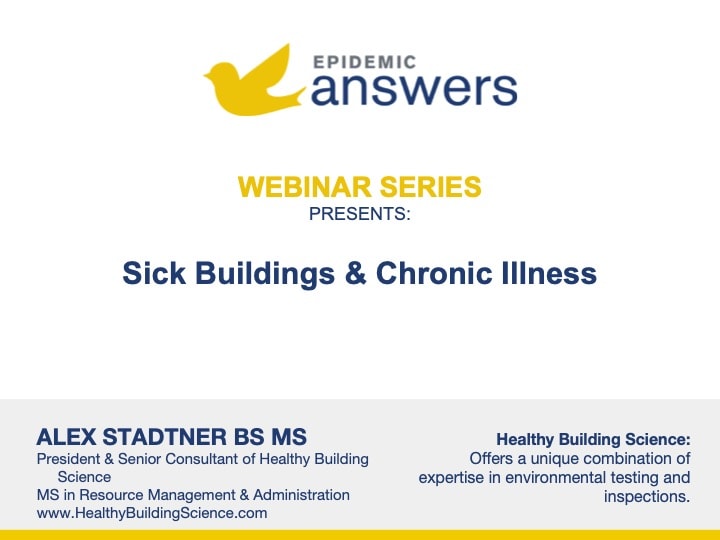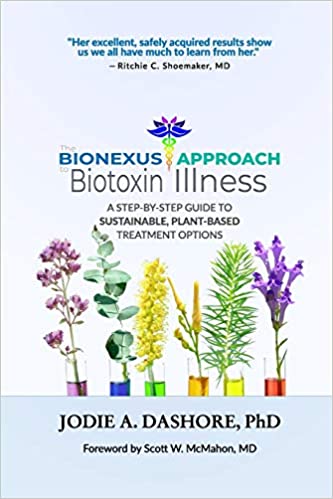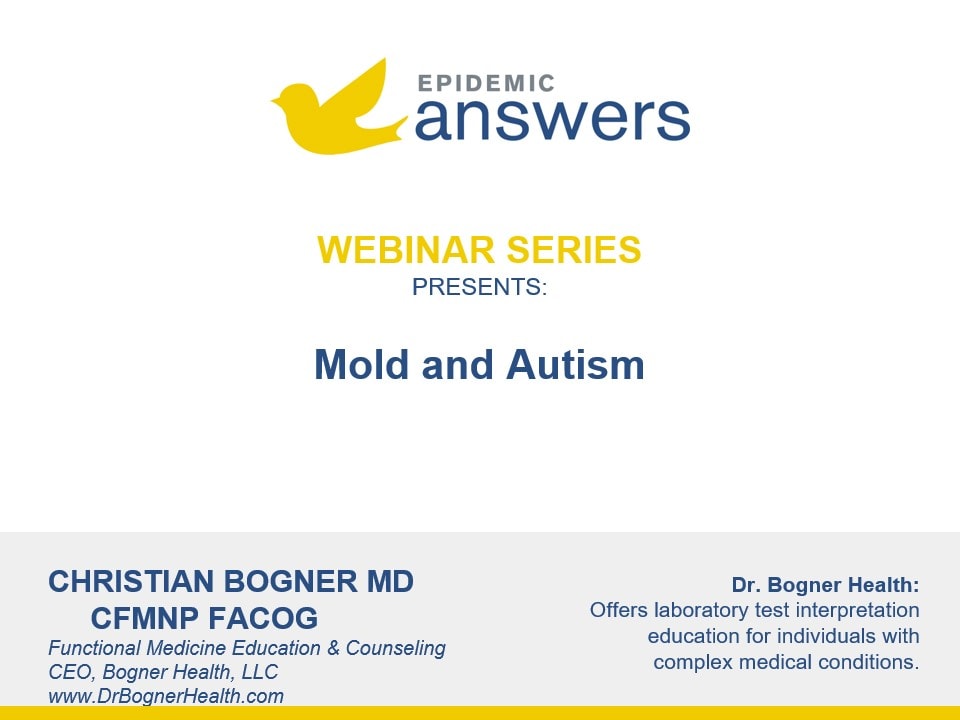We interviewed Jodie Dashore PhD, OTD, MSc about mold and mycotoxin illness. Mycotoxins are toxic chemicals produced by fungi such as mold that can cause disease and even death. You can watch the replay below. Please note that you will be asked to provide your email address at the 30-minute mark to continue viewing to the replay.
Mold and Mycotoxin Illness
Many practitioners report that addressing mold and mycotoxin illness can significantly help if a client has hit a plateau in symptom relief. Patients who address the possibility of mold and mycotoxin illness often report that treating it was the single biggest factor in reversal of symptoms. Mold and mycotoxin illness can play a significant role in the etiology of:
Common symptoms are:
- Fatigue
- Respiratory problems
- Problems with memory, concentration and focus
- Joint and muscle pain
- Headaches
- Nose bleeds
- Unexplained digestive problems
- Unusual pains
- Frequent urination
- Night sweats
- Tingling
- Numbness
In This Webinar
In this webinar, Dr. Dashore discussed:
- The complexities of mold illness and biotoxin illness
- Their frequent misdiagnoses
- The role of diet in managing symptoms, especially the ketogenic and Specific Carbohydrate diets
- The neurological impact of mold toxins such as damage to the hypothalamus
- The development of conditions like PANS/PANDAS and Parkinson’s
- The use of specific lab tests for diagnosis
- Genetic predispositions in biotoxin illness
- The importance of personalized treatment
- The consideration of methylation
- Detoxification strategies for different toxins
- The interplay between infections and immune response
- The significance of continuous care and adaptogenic treatments
- Dr. Dashore’s personal experiences with her son’s health challenges, including his treatment and recovery from various complex conditions such as Lyme disease, autism and mold exposure
Key Discussions
The overarching theme in each of these discussions is the intricate nature of mold and mycotoxin illness and the need for a personalized, multi-disciplinary approach to diagnosis, treatment, and management that accounts for individual genetic predisposition, current health status, and comprehensive lifestyle changes.
Understanding the systemic effects of mold exposure requires attention to detail and a willingness to explore beyond conventional medical treatments, integrating diet, herbal remedies, and environmental modifications.
Mold and Mycotoxin Illness Diagnosis and Misdiagnosis
Mold illness and mycotoxin exposure are complex conditions that are frequently overlooked or misdiagnosed as other issues, like hormonal imbalances or PCOS. Diagnosing these conditions appropriately is crucial and can be achieved through specialized lab tests, such as the Shoemaker panel and the Cunningham panel, which help identify the presence of mycotoxins and their effects on the immune system and brain health.
Dietary Interventions and Treatment Protocols
Diet plays a significant role in managing symptoms related to mold and mycotoxin illness. The ketogenic diet is mentioned as effective for adults by controlling blood sugar and inflammation, while the Specific Carbohydrate Diet (SCD) is useful for children dealing with yeast and parasite issues. Treatment must be bio-individualized, with the recognition that one-size-fits-all approaches are not effective for everyone.
Biotoxin Illness and Genetic Susceptibility
A portion of the population carries specific genetic predispositions that make them more susceptible to chronic inflammatory response syndrome (CIRS) when exposed to biotoxins. This genetic aspect of biotoxin illness means that awareness and genetic testing, such as Dr. Shoemaker’s test, are essential for understanding individual risks and crafting personalized treatment strategies.
Herbal and Naturopathic Remedies
Dr. Dashore advocates for a comprehensive approach that includes herbal remedies, homeopathy, and immune modulation as central to treating the root causes of mold and mycotoxin illness. She stresses the importance of cautious immune system support through adaptogenic herbs, correct dosing, and ongoing efforts to avoid reinfection and to manage the complexities of biotoxin illnesses effectively.
The Interconnection of Mold Illness with Other Conditions
Mold and mycotoxin exposure can exacerbate or reactivate other conditions such as Lyme disease, PANS/PANDAS, and various infections like mycoplasma. As such, mold exposure functions as a form of physiological trauma that can require individuals to revisit previous treatments for conditions that were thought to be under control. This emphasizes the necessity for practitioners to understand the multi-faceted impact of mold on overall health and the brain.
Timestamped Overview
00:00 Early autism diagnosis, sensory issues, biomedical treatment.
10:43 Pediatric neurologist assesses brain damage.
14:51 Dr. Dashore’s son struggles to express himself due to health issues.
21:50 Inflammagens cause inflammation, affecting human immune system.
24:26 Gluten in moderation causes mild discomfort.
29:36 High biofilm levels in nasal swab testing.
37:08 Visit survivingmold.com for detailed diagnosis information.
43:28 Mold and Bartonella affect amygdala, causing behavioral problems.
47:44 Treatment for Lyme infection may not eliminate it.
54:59 Herbal remedy protocol.
59:46 Mold biotoxin illness may link to cancer.
01:12:31 Essential oils, usage guidelines.
01:14:29 Herbal dosage for children and adults.
01:24:15 Using homeopathy and finding other modalities valuable.
About Jodie Dashore PhD OTD MSc
Dr. Jodie A. Dashore is an internationally recognized pioneering clinician in autism, biotoxin illness, chronic inflammatory response syndrome, and Lyme disease.
As a member of ILADS (International Lyme and Associated Diseases Society) and a Lyme-literate naturopathic clinician since 2010, Dr. Dashore has an excellent track record using all natural protocols for helping patients with chronic and treatment-resistant Lyme disease.
Dr. Dashore received her PhD in integrative medicine with her thesis focus on medical herbalism for autism. She also holds a doctorate in occupational therapy specializing in neurology with her thesis focus on traumatic brain injury and stroke. She additionally holds a post-doctoral specialization in advanced neuro-sensory integration.

You can find out more about her at her website: www.bionexushealth.com
Disclaimer
This webinar is not a substitute for medical advice, treatment, diagnosis, or consultation with a medical professional. It is intended for general informational purposes only and should not be relied on to make determinations related to treatment of a medical condition. Epidemic Answers has not verified and does not guaranty the accuracy of the information provided in this webinar.
Still Looking for Answers?
Visit the Epidemic Answers Practitioner Directory to find a practitioner near you.
Join us inside our online membership community for parents, Healing Together, where you’ll find even more healing resources, expert guidance, and a community to support you every step of your child’s healing journey.
Sources & References
Baker, S., et al. Case Study: Rapid Complete Recovery From An Autism Spectrum Disorder After Treatment of Aspergillus With The Antifungal Drugs Itraconazole And Sporanox. Integr Med (Encenitas). 2020 Aug;19(4):20-27.
Bennett, J.W., et al. Mycotoxins. Clinical Microbiology Reviews. Jul 2003: 497-516.
Berndtson, K., et al. Medically sound investigation and remediation of water-damaged buildings in cases of CIRS-WDB. Center for Research on Biotoxin Associated Illness. 2016 Jan 19.
Berry, Y. A Physician’s Guide to Understanding and Treating Biotoxin Illness. 2014.
de Allori, M.C.G., et al. Antimicrobial resistance and production of biofilms in clinical isolates of coagulase-negative Staphylococcus strains. Biol Pharm Bull. 2006 Aug;29(8):1592-6.
De Santis, B., et al. Role of mycotoxins in the pathobiology of autism: A first evidence. Nutr Neurosci. 2019 Feb;22(2):132-144.
De Santis, B., et al. Study on the Association among Mycotoxins and other Variables in Children with Autism. Toxins (Basel). 2017 Jun 29;9(7):203.
Hope, J. A review of the mechanism of injury and treatment approaches for illness resulting from exposure to water-damaged buildings, mold, and mycotoxins. ScientificWorldJournal. 2013 Apr 18;2013:767482.
Hudnell, H.K. Chronic biotoxin-associated illness: multiple-system symptoms, a vision deficit, and effective treatment. Neurotoxicol Teratol. Sep-Oct 2005;27(5):733-43.
Institute of Medicine (US) Committee on Damp Indoor Spaces and Health. Damp Indoor Spaces and Health. Washington (DC): National Academies Press (US); 2004.
Kali, A. Antibiotics and bioactive natural products in treatment of methicillin resistant Staphylococcus aureus: A brief review. Pharmacogn Rev. Jan-Jun 2015;9(17):29-34.
Kontoyiannis, D.P., et al. Treatment principles for the management of mold infections. Cold Spring Harb Perspect Med. 2014 Nov 6;5(4):a019737.
Oliva, A., et al. High Potency of Melaleuca alternifolia Essential Oil against Multi-Drug Resistant Gram-Negative Bacteria and Methicillin-Resistant Staphylococcus aureus. Molecules. 2018 Oct 9;23(10):2584.
Ratnaseelen, A.M., et al. Effects of Mycotoxins on Neuropsychiatric Symptoms and Immune Processes. Clin Ther. 2018 Jun;40(6):903-917.
Salari, M.H., et al. Antibacterial effects of Eucalyptus globulus leaf extract on pathogenic bacteria isolated from specimens of patients with respiratory tract disorders. Clin Microbiol Infect. 2006 Feb;12(2):194-6.
Shoemaker, R.C., et al. Sick building syndrome (SBS) and exposure to water-damaged buildings: time series study, clinical trial and mechanisms. Neurotoxicol Teratol. Sep-Oct 2006;28(5):573-88.
Shoemaker, R.C., et al. Structural brain abnormalities in patients with inflammatory illness acquired following exposure to water-damaged buildings: a volumetric MRI study using NeuroQuant®. Neurotoxicol Teratol. Sep-Oct 2014;45:18-26.
Shoemaker, R.C., et al. A time-series study of sick building syndrome: chronic, biotoxin-associated illness from exposure to water-damaged buildings. Neurotoxicol Teratol. Jan-Feb 2005;27(1):29-46.
Resources
Articles
Dr. Shoemaker’s 11 Step Treatment Protocol
Books
Dashore, Jodie. The BioNexus Approach to Biotoxin Illness. Blurb, 2020.
Shoemaker, Ritchie MD, et al. The Art and Science of CIRS Medicine. BookBaby, 2020.
Shoemaker, Ritchie MD, et al. Surviving Mold: Life in the Era of Dangerous Buildings. Otter Bay Books, 2010.
Vetter, Paula. Mold Illness: Surviving and Thriving: A Recovery Manual for Patients & Families Impacted By CIRS. BookBaby, 2018.
Websites
Tests
Great Plains Laboratory MycoTOX Profile
Videos
The Great Plains Laboratory: Autism and Mold Exposure: Why Testing for Mycotoxins is So Important



